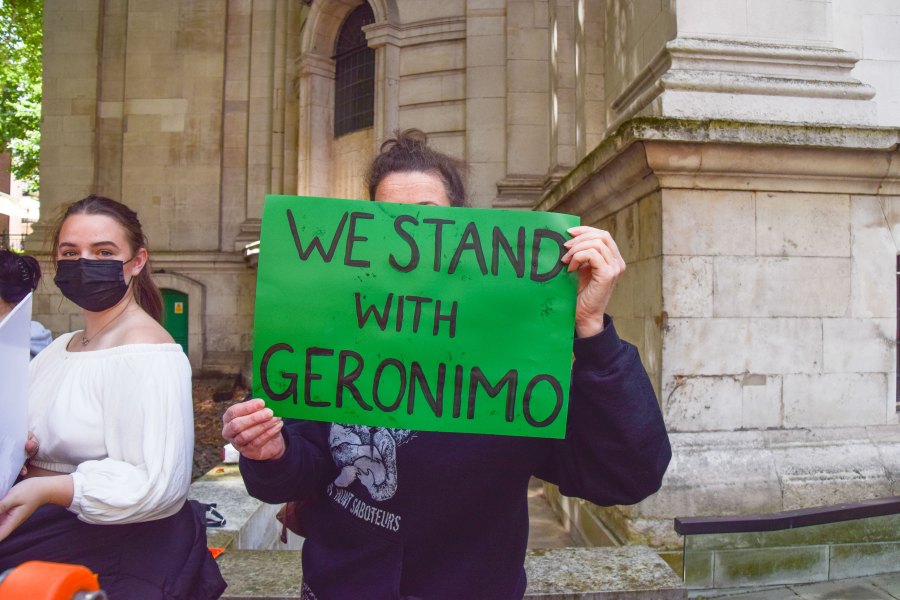
More than 100,000 people have signed a petition calling on the Prime Minister Boris Johnson to save Geronimo the alpaca from being euthanised by Defra.
Geronimo, who was imported from New Zealand, has twice tested positive for bovine TB using the Enferplex blood test, meaning he has to be euthanised under government guidelines.
According to Defra figures, 28,356 animals - the vast majority being cattle - were slaughtered due to a bTB incident in England in the 12 months to March 2021, while 205 camelids were culled in 2020.
But it is Geronimo's case which has received significant media attention. Owner Helen Macdonald believes the two TB tests were false positives, and she has also been refused permission to have a third test.
The veterinary nurse recently lost her final High Court appeal to save the alpaca, and now a warrant has been signed for him to be put down.
She said she will not break the law when government officials attend her farm to euthanise Geronimo, but she added she will not "make it easy".
"I'm not going to be helping them kill an animal that does not need to be killed," she said.
"This is an animal injustice and everyone can relate to it and people are coming from all sectors of farming to support us.
"We can make a difference. Geronimo is the poster boy for doing a better job than what we have done in the past."
This week, campaigners staged a protest outside Downing Street over the issue, while more than 100,000 people have signed a petition calling for the Prime Minister to intervene.
Elsewhere, around 30 people, including fellow alpaca farmers, gathered outside Defra’s headquarters in Smith Square, Westminster on Monday.
But Mr Johnson's spokesman insisted the order would not be backtracked, adding that Defra secretary George Eustice had "interrogated all the evidence".
The spokesman said: "We know how distressing losing animals is for anyone. That’s why the environment secretary has looked at this extremely carefully, indeed multiple times over a number of years and interrogated all the evidence.
"The fact remains that Geronimo has sadly tested positive twice, using a highly specific, reliable and validated test."
George Eustice said he knew it was "soul-destroying" for animals to be ordered to be put down due to the 'insidious disease', but that it was necessary.
"There has been a great deal of focus on the case of Geronimo the alpaca last week," he said recently in the Daily Mail.
"However, each week, on average, we have to remove more than 500 cattle from herds due to infection in England alone. Behind every one of those cases is a farmer who has suffered loss and tragedy.
"Farmers understand that infected animals are a risk to the remainder of their herd, so while the loss of individual animals is always a tragedy, the farming communities have worked with our government vets in this arduous but necessary endeavour."
It comes as the British Alpaca Society (BAS) called for urgent talks with Defra amid concern that the recent events had considerably undermined confidence in the current bTB testing regime.
The unique circumstances that had developed relating to Geronimo clearly showed the testing system was not working as well as it should, the body said.
It highlighted concerns to Defra specifically in Geronimo’s case in March 2018 about the potential adverse effects of multiple priming before an Enferplex test in alpacas.
To date no evidence has been produced to explain the effects of this practice on test results.
A BAS spokesperson said: "Defra will not allow further testing on Geronimo. There is no science to explain the effects of multiple priming on the outcomes of the Enferplex test in alpacas and no research has been carried out.
"Four years on from the tests Geronimo is healthy, as are the alpacas which have been sharing his paddock, and indeed the alpacas that travelled from New Zealand with Geronimo on the same or contiguous crates."
BAS asked the government for controlled experiments to produce evidence that resolves concerns around the effect of multiple priming on test results.
The body also urged Defra to include alpacas in ongoing bovine bTB vaccine work, which it said would move alpaca owners into a position where they could 'truly engage with bTB control measures in the animals they own'.
